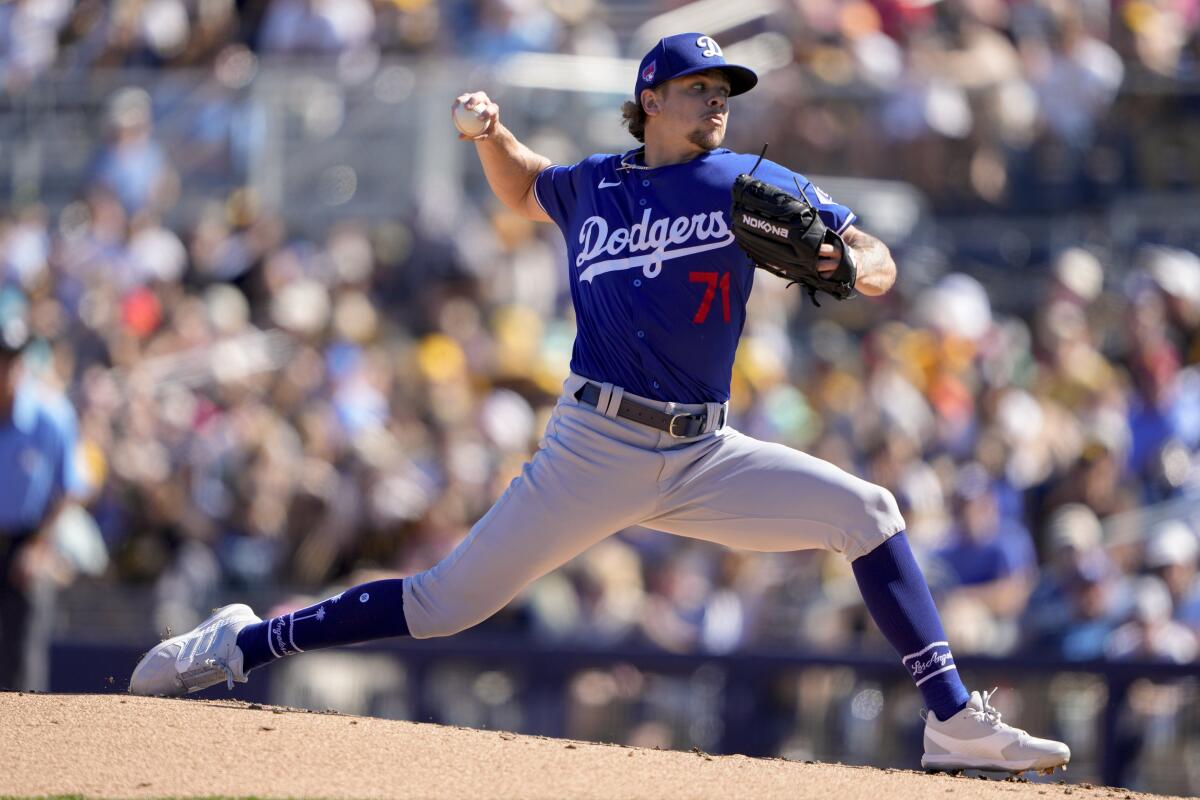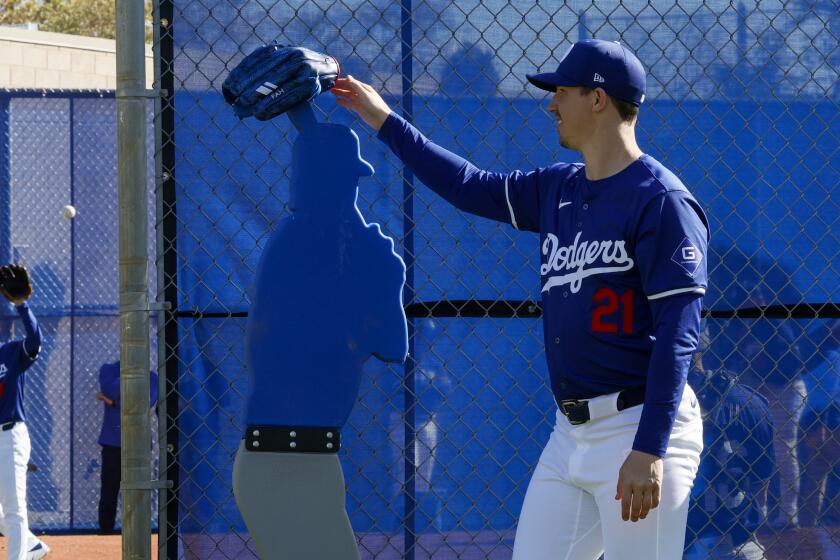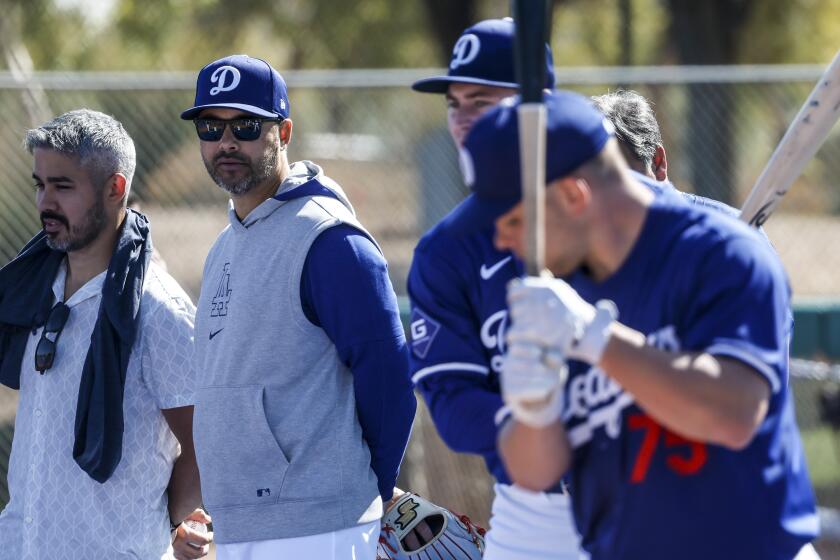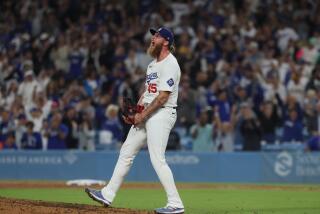With rookie struggles behind him, Gavin Stone making a case for Dodgers rotation spot

- Share via
PHOENIX — Gavin Stone’s statistics tell one story about his rookie season.
In his debut campaign last year, the Dodgers’ starting pitching prospect gave up 31 earned runs in 31 innings for a 9.00 ERA. He issued 13 walks (and two hit batters) while collecting only 22 strikeouts. He posted a WHIP (walks and hits per innings pitched) of nearly two. And he yielded eight home runs in his eight total outings.
There are poor small-sample stat lines. And then there is that.
“It was extremely hard,” Stone said of handling such mighty struggles. “It definitely shakes your confidence.”
Ask around at Dodgers spring camp about the 25-year-old right-hander, however, and the reviews of Stone’s 2023 performance — and continued progress since — are accompanied by a very different tone.
A couple weeks into this year’s spring camp, Walker Buehler’s exact timetable to return remains unclear. But it is not an unexpected development.
“Couldn’t have asked for more,” manager Dave Roberts said. “The stat line, the surface is not everything we look at. So there’s a lot of things underlying from Gavin’s performance last year that were really positive.”
Echoed pitching coach Mark Prior: “Easier for me to say this probably than to live it, but I thought he had a great year. We view it as a successful campaign, more so because of what he went through and what he did, the strides he did make.”
Even veteran catcher Austin Barnes chipped in with praise: “Stuff like that can mess with your head sometimes. But he came back, he threw the ball really well and just started to find himself as a pitcher.”
That’s because the saga that was Stone’s first big league season can only properly be told in two distinct parts.
Part I: His disastrous debut stint in May that ended with a two-inning, seven-run shellacking against the Tampa Bay Rays, leaving the former top prospect looking more like a potential lost cause.
Part II: The mental and physical rebound Stone made by the end of the year, managing to not only return to the majors in August and September, but also pitch well enough to enter this spring with a legitimate chance of making the opening day rotation.
“The biggest takeaway from last year was just how to deal with failure and how to come back from it,” said Stone, whose slender frame and youthful looks (a scruffy goatee aside) belies a fiery internal drive and rigid mental fortitude. “All last year, I heard about how everybody has that moment of failure, and you just gotta figure out how to come out of it. So that’s the biggest key this year. Cleaning the mind and getting a fresh start.”
Indeed, the ugly numbers that once marred Stone’s statistical slate have long been wiped clean.
In hindsight, there were myriad reasons behind his first-half struggles — from an early season toe blister on his push-off foot that subtly altered his mechanics; to a pitch-tipping tendency Dodgers coaches identified following Stone’s implosion against the Rays, who seemed to jump all over any pitch that wasn’t his trademark changeup.
“People could see when I wasn’t throwing the changeup,” Stone said. “Because my arm would move just to get to other pitches.”
More important to the Dodgers, however, was the way Stone rebounded over the latter half of the season.
He found success following a return to triple A, earning pitcher of the week honors in the Pacific Coast League twice in July.
He was recalled in August for a spot outing at Fenway Park against the Boston Red Sox, earning his first major league win in a six-inning, four-run effort.
Then, after another hiccup against the San Diego Padres in September, he closed his season with a pair of impressive efforts later in the month, including a scoreless three-inning save during a trip to Seattle.
“It shows he’s got that internal determination,” Prior said. “He continued to will himself to try and find a way to get better.”
Key to Stone’s success was a midseason change he made to his pitching arsenal.
During his first call-up, the former fifth-round pick used a slider to complement his go-to fastball-changeup combination. While it was effective at generating whiffs, opponents crushed it when he left it hanging in the zone. Add in the pitch-tipping on non-changeups, and at times Stone’s early MLB starts looked more like batting practice than a live game.
“Failure sucks,” Stone said, bluntly. “So you do everything you can not to feel that feeling again.”
Thus, after returning to triple A, Stone worked with pitching coaches Doug Mathis and Justin DeFratus on his mechanics (with his toe healed, he eliminated many of the arm-side misses that hampered his initial MLB call-up) and his arsenal.
He shelved his big-breaking slider for a more consistent cutter, sacrificing some right-to-left movement for a pitch with more velocity. He paired that with a two-seam fastball that broke the opposite way, dusting off a variation of the heater he hadn’t thrown since his days at the University of Central Arkansas.
“It was a big learning year for him,” Mathis said, noting the reimagined pitch mix allowed Stone to attack either edge of the strike zone and set up his changeup as a put-away pitch.
“Gavin is a guy who has relied on the changeup a lot throughout his career, and that’s always gonna be a good pitch for him,” Mathis added. “But he really realized, he’s able to make more pitches than he ever had to [before]. And he likes doing it. He likes being able to move that ball around. It was great.”
This spring, Stone is hoping to parlay it into a more extended MLB opportunity.
With Walker Buehler likely to miss a month (or more) at the start of the season while finishing Tommy John rehabilitation, the Dodgers have an open competition for the final spot in their five-man rotation.
Emmet Sheehan and Michael Grove are also in the mix, other young pitchers with more big league experience than Stone.
Andre Ethier, who retired after the 2017 season, has been helping Miguel Vargas make the transition from playing the infield to the Dodgers outfield.
Stone’s performance in camp, however, is already turning heads. In a scoreless inning of work during the Dodgers’ Cactus League opener Thursday, for example, Stone routinely hit 96 mph with his fastball (an uptick from last year that he attributes to the 10 pounds of weight he added this offseason) and fanned Padres superstar Fernando Tatis Jr. with a two-strike changeup.
“I felt great,” Stone said afterward. “Ball feels like it’s coming out of my hand a lot better than last year. Just gotta continue to do that.”
If he does, a pitcher who once looked overmatched in the majors should get more chances to keep rewriting his big league story.
Last year, he had a decent debut season in spite of the crooked numbers that accompanied it.
This season, he is hoping the stats more obviously reflect the strides he has made.
“Once your confidence is shaken like that, you just gotta figure out a way to come out of it and keep throwing, keep doing you, keep throwing your pitches, and just put them in better spots,” Stone said. “To come out of that spot I was in was big. So hopefully we don’t go back there.”
More to Read
Are you a true-blue fan?
Get our Dodgers Dugout newsletter for insights, news and much more.
You may occasionally receive promotional content from the Los Angeles Times.









